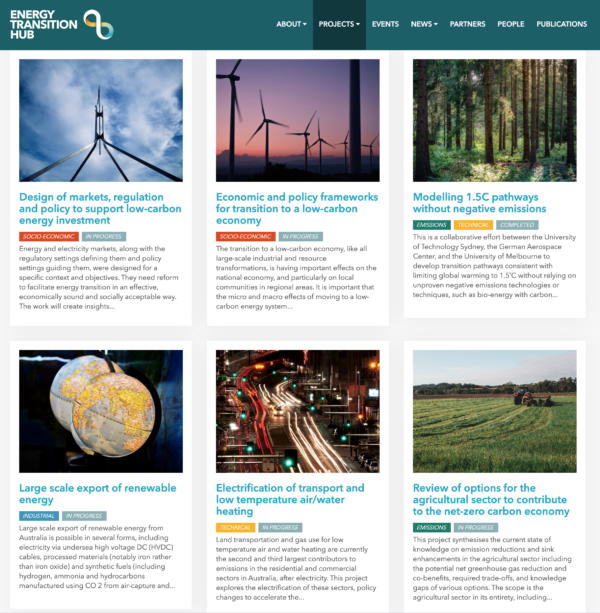The Australian Federal Government, in advance of releasing a technology roadmap that it has already stated will shift funding from renewable-energy-based carbon-reduction solutions to other ‘technology-based’ avenues for meeting Australia’s Paris Agreement commitments, has pulled the plug on two years of funding for the international research collaboration known as the Energy Transition Hub.
The University of Melbourne and the Australian National University led the collaboration with leading German research institutions such as the Potsdam Institute for Climate Impact Research (PIK), which was initiated in 2017 on a handshake between then Prime Minister Malcolm Turnbull and German Chancellor Angela Merkel at the G7 leaders’ summit.
Its remit was to combine resources of the two countries, which have been on similar transition trajectories, in solving problems of energy market design, policy and regulation.
At the time, co-director of the Hub, PIK’s Associate Professor Malte Meinshausen, said, “The opportunity is to build a new growth vision for Australia that combines the mineral wealth tradition of the past with the renewable potential of the future. If Australia plays its cards right, the economic advantage of low cost renewable electricity can build new growth that includes energy-intensive industries. An energy transition based on tradition.”
Germany recently decided not to extend funding beyond its initial 2.5-year commitment which ends this quarter, and on Friday Hub participants were informed that the Department of Foreign Affairs and Trade (DFAT) would not follow through on its commitment to fund the collaboration through to 2022 — Australian funding will instead cease in June.
The early exit sees DFAT redirect the remaining $1.75 million in funding due to the Energy Transition Hub towards supporting “our strategic priorities with Germany and other European partners more effectively, including potential collaboration with Germany on hydrogen,” a spokesperson for DFAT said.
Renewable transition abandoned in favour of …
The decision seems intended to emphasise the the Government’s declaration that support for renewables has reached an end point, as announced by Federal Minister for Energy and Emissions Reduction, Angus Taylor in a speech to the Committee for Economic Development of Australia (CEDA) last month.
A the CEDA event on 28 February, Taylor spoke on the topic, Future directions in energy technologies, saying the government had already invested $10.4 billion in clean-tech projects with a value of $35 billion, but, he declared, “we are coming to an end of the value of these investments.
“Wind and solar are economic as a source of pure energy at least, and the government should not crowd out private sector investment … We must move our investments to the next challenges – hydrogen, carbon capture and storage, lithium and advanced livestock feed supplements to name a few.”
A senior ANU researcher, one of some 60 renewable-energy and policy experts contributing to projects conducted by the Energy Transition Hub yesterday told pv magazine that “Loss of Hub funding coupled with exhaustion of ARENA funding, coupled with a supposed pivot away from Government support from solar and wind towards hydrogen and CCS, and other far-away and possibly pie-in-the-sky technologies is not good.”
pv magazine understands that negotiations regarding support for the Hub have shifted to other avenues, and that Ross Garnaut, Chair of the Hub’s international board, and co-directors Meinshausen ANU’s Professor Frank Jotzo who is also Director of the Centre for Climate Economics and Policy, are withholding comment until an outcome is reached.
… A coal revival
However, another well-known researcher involved in the Energy Transition Hub, who also asked to remain anonymous for the time being, told pv magazine, “It’s a pretty amazing decision — especially since the government has allocated $4 million for a coal-power feasibility study that’ll go nowhere, but feels the need to rip $1.7 million funding out of a program looking at the real challenges and opportunities in energy transition.”
The researcher is referring to the recent commitment by the Federal Government to provide $4 million for a feasibility study into a new 1GW high-energy low-emissions coal-fired power plant proposed for Collinsville in Queensland by Indigenous-owned Shine Energy.
The proposal has been widely criticised on the basis that any investment in coal-fired electricity generation is uneconomical compared with renewable alternatives, making a mockery of the Government’s stated intention that the Supporting Reliable Energy Infrastructure Program under which the Collinsville study is funded is intended to “ensure affordable and reliable energy for commercial and industrial customers” in Central and Far North Queensland.

Image: Energy Transition Hub
Hydrogens ain’t hydrogens
The senselessness of withdrawing funding from the Energy Transition Hub becomes even more apparent given an overview of Hub projects still in progress, which include investigations into Hydrogen synthesis pathways; Large scale export of renewable energy, and options for synthetic fuels “including hydrogen, ammonia and hydrocarbons manufactured using CO2 from air-capture and hydrogen from water splitting”; and even a Review of options for the agricultural sector to contribute to the net-zero carbon economy.
That is, the work of the Energy Transition Hub seems to correspond with the as yet unclarified ambitions of the technology roadmap, except perhaps that it is aligned with renewable-energy technologies, seeking to identify layered and logical opportunities for carbon emissions reduction, cost-effective electricity generation, and export of energy from renewable resources that will help not only Australia’s economy, but support the global imperative to transition away from fossil fuel sources.
The underlying message appears to be that renewably generated hydrogen is not on the Government’s roadmap.
Responding to news of the axing of support for the Energy Transition Hub, Lily D’Ambrosio, Victoria’s Minister for Energy, Environment and Climate Change, told The Sydney Morning Herald on Saturday, “This slashing of funding is extremely disappointing and calls into question whether the Federal Government has any real commitment to cutting emissions and transitioning to new energy sources.”
This content is protected by copyright and may not be reused. If you want to cooperate with us and would like to reuse some of our content, please contact: editors@pv-magazine.com.









1 comment
By submitting this form you agree to pv magazine using your data for the purposes of publishing your comment.
Your personal data will only be disclosed or otherwise transmitted to third parties for the purposes of spam filtering or if this is necessary for technical maintenance of the website. Any other transfer to third parties will not take place unless this is justified on the basis of applicable data protection regulations or if pv magazine is legally obliged to do so.
You may revoke this consent at any time with effect for the future, in which case your personal data will be deleted immediately. Otherwise, your data will be deleted if pv magazine has processed your request or the purpose of data storage is fulfilled.
Further information on data privacy can be found in our Data Protection Policy.